
Götterdämmerung, WWV 86D, is the last in Richard Wagner's cycle of four music dramas titled Der Ring des Nibelungen. It received its premiere at the Bayreuth Festspielhaus on 17 August 1876, as part of the first complete performance of the Ring.

Wilhelm Richard Wagner was a German composer, theatre director, polemicist, and conductor who is chiefly known for his operas. Unlike most opera composers, Wagner wrote both the libretto and the music for each of his stage works. Initially establishing his reputation as a composer of works in the romantic vein of Carl Maria von Weber and Giacomo Meyerbeer, Wagner revolutionised opera through his concept of the Gesamtkunstwerk, by which he sought to synthesise the poetic, visual, musical and dramatic arts, with music subsidiary to drama. He described this vision in a series of essays published between 1849 and 1852. Wagner realised these ideas most fully in the first half of the four-opera cycle Der Ring des Nibelungen.
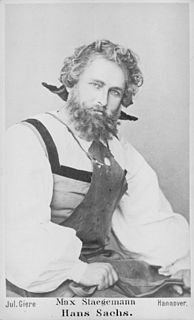
Die Meistersinger von Nürnberg, WWV 96, is a music drama, or opera, in three acts, by Richard Wagner. It is the longest opera commonly performed, taking nearly four and a half hours, not counting two breaks, and is traditionally not cut. With Hans von Bülow conducting it was first performed on 21 June 1868 at the National Theater in Munich, today home of Bavarian State Opera.
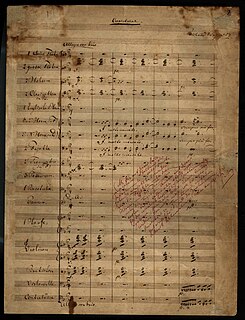
Der fliegende Holländer, WWV 63, is a German-language opera, with libretto and music by Richard Wagner. The central theme is redemption through love. Wagner conducted the premiere at the Königliches Hoftheater Dresden in 1843.

Tristan und Isolde, WWV 90, is an opera in three acts by Richard Wagner to a German libretto by the composer, based largely on the 12th-century romance Tristan and Iseult by Gottfried von Strassburg. It was composed between 1857 and 1859 and premiered at the Königliches Hoftheater und Nationaltheater in Munich on 10 June 1865 with Hans von Bülow conducting. Wagner referred to the work not as an opera, but called it "eine Handlung".
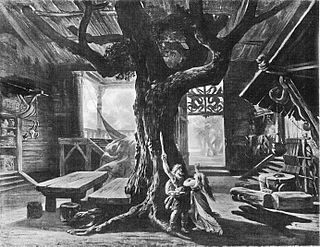
Die Walküre, WWV 86B, is the second of the four music dramas that constitute Richard Wagner's Der Ring des Nibelungen. It was performed, as a single opera, at the National Theatre Munich on 26 June 1870, and received its first performance as part of the Ring cycle at the Bayreuth Festspielhaus on 14 August 1876.
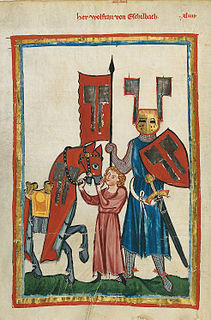
Wolfram von Eschenbach was a German knight, poet and composer, regarded as one of the greatest epic poets of medieval German literature. As a Minnesinger, he also wrote lyric poetry.
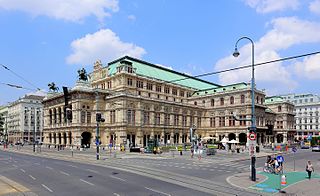
Opera in German is that of the German-speaking countries, which include Germany, Austria, and the historic German states that pre-date those countries.

Die Feen is an opera in three acts by Richard Wagner. The German libretto was written by the composer after Carlo Gozzi's La donna serpente. Die Feen was Wagner's first completed opera, but remained unperformed in his lifetime. It has never established itself firmly in the operatic repertory although it receives occasional performances, on stage or in concert, most often in Germany. The opera is available on CD and in a heavily cut, adapted-for-children version, DVD.

Tannhäuser is an 1845 opera in three acts, with music and text by Richard Wagner. It is based on two German legends: Tannhäuser, the mythologized medieval German Minnesänger and poet, and the tale of the Wartburg Song Contest. The story centres on the struggle between sacred and profane love, as well as redemption through love, a theme running through most of Wagner's work.

Der Vampyr is a Romantic opera in two acts by Heinrich Marschner. The German libretto by Wilhelm August Wohlbrück is based on the play Der Vampir oder die Totenbraut (1821) by Heinrich Ludwig Ritter, which itself was based on the short story The Vampyre (1819) by John Polidori. The first performance took place on 29 March 1828 in Leipzig, where it was a hit.
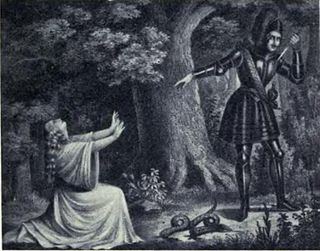
Euryanthe is a German grand heroic-romantic opera by Carl Maria von Weber, first performed at the Theater am Kärntnertor in Vienna on 25 October 1823. Though acknowledged as one of Weber's most important operas, the work is rarely staged because of the weak libretto by Helmina von Chézy. Euryanthe is based on the 13th-century French romance L'Histoire du très-noble et chevalereux prince Gérard, comte de Nevers et la très-virtueuse et très chaste princesse Euriant de Savoye, sa mye.

Pauline Maria de Ahna (also known as Pauline Strauss was a German operatic soprano and the wife of composer Richard Strauss. Her singing career was closely tied to her husband's career as a conductor and composer. From 1890–1894 she was committed to the Staatskapelle Weimar and from 1894–1897 she was committed to the Bavarian State Opera, during which times her husband was the principal conductor of those theaters. She also sang under her husband's baton at the Bayreuth Festival and in the world premiere of his first opera Guntram. Other houses at which performed included the Berlin State Opera, La Monnaie, and the Liceu. Her repertoire included leading roles in the operas of Beethoven, Humperdinck, Mozart, von Weber, and Wagner. After she gave birth to their son Franz Strauss in 1897 she retired from the opera stage. She thereafter continued to periodically perform in concerts of her husband's music, particularly lieder. Strauss credited her as his muse for many of his compositions, including the title role in Salome, the Countess Madeleine in Capriccio, and the Four Last Songs among others.

Bianca e Falliero, ossia Il consiglio dei tre is a two-act operatic melodramma by Gioachino Rossini to an Italian libretto by Felice Romani. The libretto was based on Antoine-Vincent Arnault's play Les Vénitiens, ou Blanche et Montcassin.

Die Hochzeit des Camacho is a Singspiel in two acts by Felix Mendelssohn, to a libretto probably written largely by Friedrich Voigts, based on an episode in Don Quixote by Cervantes. The opera is listed as Mendelssohn's op. 10. It was written between 1824 and 1825, and first performed publicly at the Berlin Schauspielhaus on 29 April 1827.
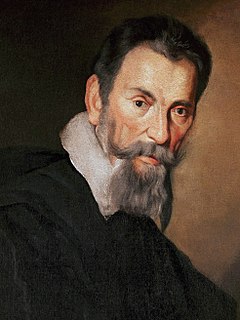
The Italian composer Claudio Monteverdi (1567–1643), in addition to a large output of church music and madrigals, wrote prolifically for the stage. His theatrical works were written between 1604 and 1643 and included operas, of which three—L'Orfeo (1607), Il ritorno d'Ulisse in patria (1640) and L'incoronazione di Poppea (1643)—have survived with their music and librettos intact. In the case of the other seven operas, the music has disappeared almost entirely, although some of the librettos exist. The loss of these works, written during a critical period of early opera history, has been much regretted by commentators and musicologists.
La donna serpente is a fable by Carlo Gozzi which premiered at the Teatro Sant'Angelo, Venice, in 1762. The play was adapted as a children's TV film, broadcast Rete 1, 26 March 1976, directed by it:Alessandro Brissoni, starring Ave Ninchi, Carlo Bagno, Enrico Osterman and Gianni Bortolotto.















